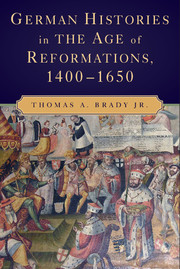Book contents
- Frontmatter
- Contents
- Figures, Maps, and Tables
- Acknowledgments
- A Note on Usages
- Map 1 The Empire in 1547
- Map 2 The Peace of Westphalia, 1648
- Part I The Empire, the German Lands, and Their Peoples
- 1 Reformations in German Histories
- 2 Shapes of the German Lands
- 3 Temporal Estates – Farmers, Traders, Fighters
- 4 The Church and the Faith
- Part II Reform of the Empire and the Church, 1400–1520
- Part III Church, Reformations, and Empire, 1520–1576
- Part IV Confessions, Empire, and War, 1576–1650
- Appendix
- Glossary
- Bibliography
- Index
3 - Temporal Estates – Farmers, Traders, Fighters
Published online by Cambridge University Press: 05 June 2012
- Frontmatter
- Contents
- Figures, Maps, and Tables
- Acknowledgments
- A Note on Usages
- Map 1 The Empire in 1547
- Map 2 The Peace of Westphalia, 1648
- Part I The Empire, the German Lands, and Their Peoples
- 1 Reformations in German Histories
- 2 Shapes of the German Lands
- 3 Temporal Estates – Farmers, Traders, Fighters
- 4 The Church and the Faith
- Part II Reform of the Empire and the Church, 1400–1520
- Part III Church, Reformations, and Empire, 1520–1576
- Part IV Confessions, Empire, and War, 1576–1650
- Appendix
- Glossary
- Bibliography
- Index
Summary
Ill fares the land, to hast'ning ills a prey,
Where wealth accumulates, and men decay;
Princes and lords may flourish, or may fade;
A breath can make them, as a breath has made;
But a bold peasantry, their country's pride,
When once destroyed, can never be supplied.
Oliver Goldsmith.With daring aims, irregularly great,
Pride in their port, defiance in their eye,
I see the lords of human kind pass by.
Oliver GoldsmithThe concept of estates or orders – functionally distinct, legally defined social groups – shaped the feudal age's social consciousness as fundamentally as the idea of class does that of the capitalist age. Adalbero (d. 1030), an eleventh-century bishop of Laon in the kingdom of West Francia, expressed in a classic form the three orders that comprise what he called “the House of God”: those who pray, those who fight, and those who work. Over the next 500 years, Adalbero's “orders” became “estates,” a less normative and more descriptive term rooted in the law. The change reflected such long-range trends as the advance of a money economy, greater social mobility, the decay of kinship, and of Christian notions of equality. Some regretted the results. In 1494 the Strasbourg lawyer-poet Sebastian Brant (1457–1521) condemned the decay of social distinctions as contrary to God's providence: “In every land the disgrace is great/ No longer is there anyone/satisfied with his estate.
- Type
- Chapter
- Information
- German Histories in the Age of Reformations, 1400–1650 , pp. 29 - 48Publisher: Cambridge University PressPrint publication year: 2009



